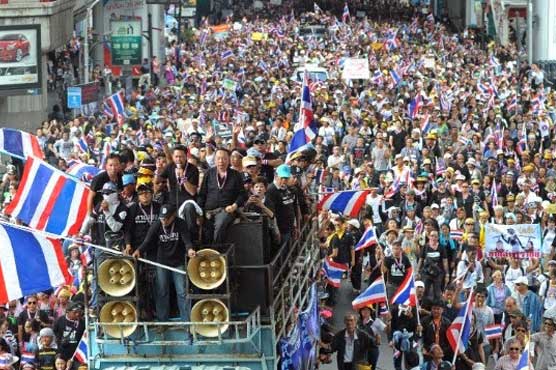Key facts about Thailand's political crisis

The elections in Thailand were marred by polling station blockades and an opposition boycott.
BANGKOK, Feb 02, 2014 (AFP) - Here are key facts about Thailand's political crisis after the kingdom held elections marred by polling station blockades and an opposition boycott:
Q: Why did Thailand hold an election?
Prime Minister Yingluck Shinawatra called the snap poll in an unsuccessful attempt to quell rising tensions as she grappled with sometimes bloody street protests aimed at toppling her government.
The main opposition Democrat Party, which has not won an elected majority in two decades, opted to boycott the poll and throw its support behind the demonstrations.
The rallies, led by former Democrat MPs, have sought to curb the political dominance of Yingluck's older brother Thaksin Shinawatra, a controversial tycoon turned politician who was ousted as premier in a 2006 military coup.
The protesters tried to derail the election, calling for a postponement of a year or more in order for an unelected "people's council" to oversee vaguely defined reforms to tackle corruption and alleged vote-buying.
Q: Who are the competing protest groups?
Thailand has been rocked by sporadic bouts of often-violent rival protests since Thaksin was deposed.
The "Red Shirts", who broadly support Thaksin, and their arch rivals the royalist "Yellow Shirts" -- who are no longer active -- have dominated the street protest scene.
Yellow rallies helped to eject Thaksin or his allies from power three times, while support from the Reds swept Yingluck to power in 2011 a year after a deadly military crackdown on their street protests that left dozens dead.
The latest opposition protesters are a mixture of former Yellow Shirts, Democrat supporters, royalists, southerners, the urban middle class and other Thaksin opponents.
Q: What are the possible scenarios?
1. Protests ease
A likely victory for Yingluck, helped by support in the north and northeast and a boycott by the Democrat Party, could take the steam out of the protest movement.
Demonstrators may decide -- or be forced by authorities -- to pack up the tents and stages that have blocked major intersections in Bangkok for three weeks.
The government would still have to remain in a caretaker role until by-elections are held in constituencies where protesters blocked candidate registrations and voting.
2. Unrest continues
Emboldened by partial success in disrupting the vote, the protesters could continue their demonstrations. Sporadic and unpredictable violence could continue, with the risk of clashes with rival protest groups or authorities.
3. Judicial intervention
The Constitutional Court might annul the election after an opposition complaint, potentially citing rules stipulating that polls be held on a single day.
The last time the Constitutional Court invalidated an election was in 2006 when Thaksin won in a poll boycotted by the Democrats. Judges at the time said the election date was unfairly chosen and the arrangement of voting booths had compromised secrecy.
Yingluck is also under investigation by an anti-corruption panel for possible neglect of duty over a controversial rice subsidy scheme. If found guilty she could face impeachment.
In addition, dozens of politicians from her party face a possible five-year ban from politics over a bid -- deemed unconstitutional by the courts -- to make the upper house fully elected.
4. Military coup
The head of the army has repeatedly refused to rule out seizing power again. Some observers see a coup as a last resort that would only happen in the event of chaos or major street violence, given the risk of an uprising by the Red Shirts.

